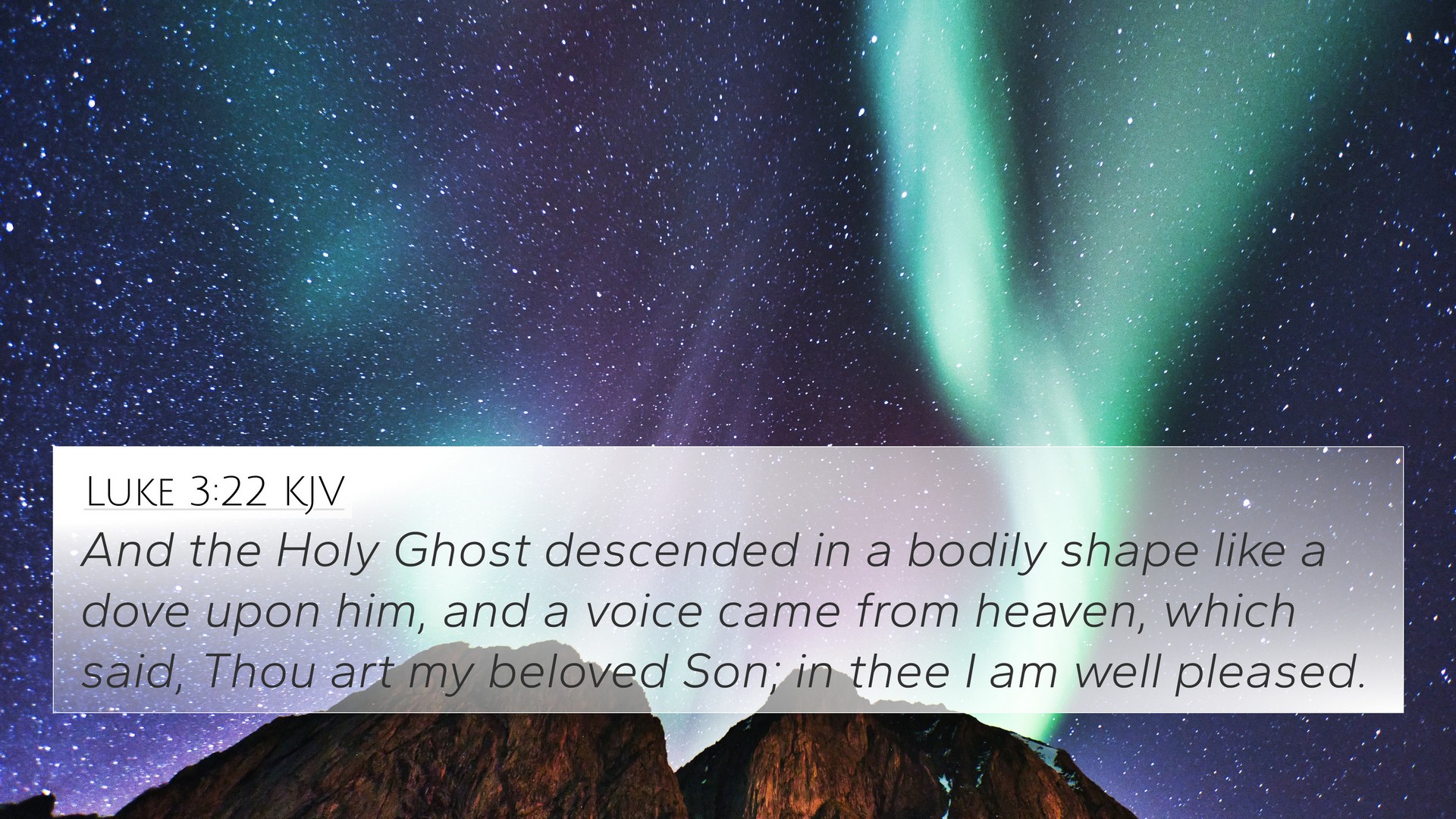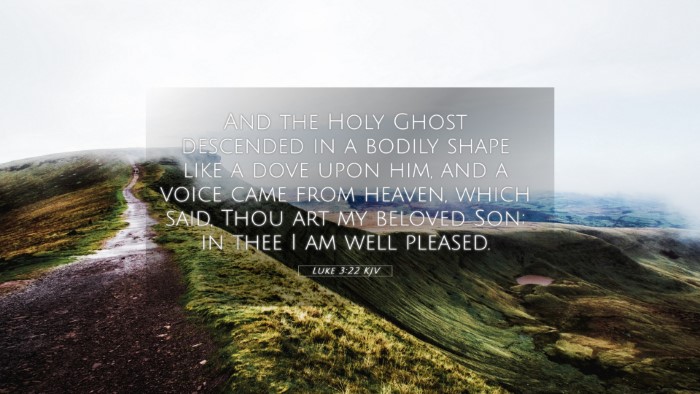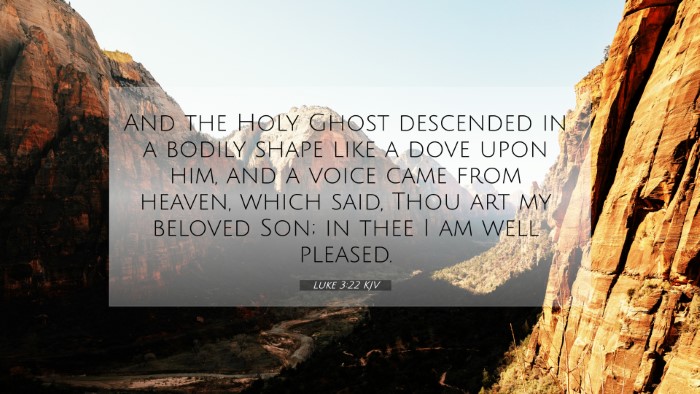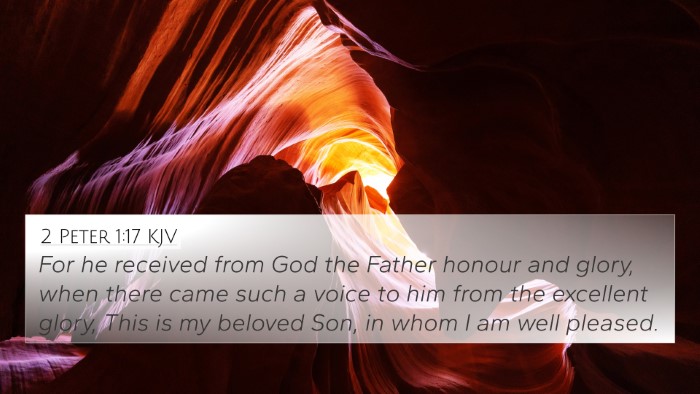Understanding Luke 3:22
Luke 3:22 states: "And the Holy Spirit descended in a bodily shape like a dove upon Him, and a voice came from heaven, which said: ‘You are My beloved Son; in You I am well pleased.’” This verse is significant as it marks the baptism of Jesus by John the Baptist and the divine affirmation of Jesus’ identity and mission.
Verse Meaning and Interpretation
This verse encapsulates a pivotal moment in the New Testament, where the divine Trinity is evident—Jesus the Son is baptized, the Holy Spirit descends, and God's voice speaks from heaven. The remarks from public domain commentaries shed further light on various aspects of this passage.
Insights from Commentaries
-
Matthew Henry:
Henry emphasizes the importance of the Holy Spirit's descent as a sign of divine approval for Jesus’ ministry. It symbolizes the empowerment necessary for the work ahead and confirms Jesus' identity as the Messiah. The voice from heaven underscores a personal relationship between Jesus and God, showing that Jesus is beloved and brings God pleasure.
-
Albert Barnes:
Barnes focuses on the illustration of the dove as a representation of purity and peace, qualities associated with the Holy Spirit. He points out the significance of God's declaration, which indicates the fruition of the prophecies concerning the Messiah. Moreover, he reflects on the implications this has for believers, affirming that just as Jesus was acknowledged publicly, Christians too are called to understand their identity in Christ.
-
Adam Clarke:
Clarke discusses the theological implications of the Trinity displayed in this moment. He acknowledges that the voice from heaven indicates the new covenant being established through Jesus. Clarke also notes how this event sets Jesus apart from all others in human history, as He is the only one with such direct affirmation from God.
Thematic Connections
Luke 3:22 not only stands alone but also connects to various other scriptures throughout the Bible, enhancing our understanding of the themes presented:
- Matthew 3:16-17: Parallel account of Jesus' baptism and divine affirmation.
- John 1:32-34: John the Baptist's testimony about Jesus' identity and the Spirit's descent.
- Isaiah 42:1: Prophetic reference to God’s chosen servant, hinting at the fulfillment in Christ.
- Romans 8:16: God's Spirit testifying with our spirit about our identity as children of God.
- 1 John 5:7: Affirmation of the Trinity; the three that bear witness in heaven.
- Acts 10:38: Reference to Jesus’ anointing with the Holy Spirit and power, establishing the continuity of this event.
- Hebrews 1:5: God's declaration about Jesus as His Son, reinforcing His unique status.
- Psalm 2:7: The Messianic prophecy about God declaring His Son, which finds its fulfillment in Jesus.
- Luke 4:18-19: Jesus quoting Isaiah after His baptism, affirming His mission as the anointed one.
- Matthew 17:5: The Transfiguration where God again identifies Jesus as His beloved Son.
Cross-Referencing Biblical Texts
Cross-referencing allows us to see the interconnections in scripture and gain deeper insights into themes of identity, divine approval, and the role of the Holy Spirit. Tools for Bible cross-referencing, such as concordances and Bible reference resources, enable believers to delve into detailed studies, enhancing their understanding of these connections.
Exploring the Thematic Bible Verse Connections
Consider how each of these cross-references enriches the biblical narrative:
- They highlight the role of the Holy Spirit in empowering believers.
- They confirm Jesus' messianic identity both in prophecy and fulfillment.
- They showcase God's relationship with Jesus, emphasizing His status as a beloved Son.
- They elucidate the continuity between Old Testament prophecies and New Testament revelations.
- They reflect on the implications for Christians in understanding their own identities as children of God.
Practical Application
Understanding Luke 3:22 encourages believers to reflect on their own baptism and the significance of the Holy Spirit in their lives. It serves as a reminder of divine approval and identity in Christ. Moreover, this study invites readers to engage in cross-referencing Bible study methods to uncover how scriptures interact and harmonize with each other.
How to Use Bible Cross-References
Utilizing a structured approach to cross-referencing can enhance personal study and sermon preparation. Here are a few methods to consider:
- Utilize Bible concordances to locate related verses quickly.
- Establish thematic links, such as the role of the Holy Spirit or God's affirmations throughout scripture.
- Explore comparative analyses of passages that deal with the identity and mission of Jesus.
- Consider historical context and prophetic literature when engaging in inter-Biblical dialogue to understand deeper meanings.
Conclusion
Luke 3:22 is a profound verse that underscores Jesus' identity and mission, confirmed through the audible voice of God and the visible presence of the Holy Spirit. By referencing interconnected scripture, individuals can explore rich biblical themes and apply them to their lives. Encouragement is found in the recognition that, just as Jesus was affirmed, believers too share in a divine relationship with God through Christ.















